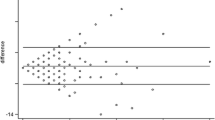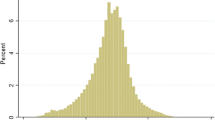Abstract
Background: Economic assessment of interventions and policies is becoming increasingly common, in large measure because of the growing emphasis on cost containment within health care. Comprehensive and reliable outcome and cost data are required to advise policy makers and clinicians as to the best use of their limited resources. The process of costing can be broken down into three connected tasks: the collection of service receipt or utilisation data relative to individual clients or patients over a defined period; the costing of each of the services used; and the combination of these two sets of information in order to calculate individual costs. The aim of this study was to compare two methodologies of collecting data on individual service use – a customised interview schedule, ICAP, and the psychiatric case register (PCR) – and to calculate costs, testing the extent of agreement between them. Method: The agreement between the ICAP and the PCR costs measurement was evaluated using the concordance correlation coefficient ρc. From all patients (n = 543) who had atleast one contact with a psychiatrist or a psychologist during the period October–December 1996, 339 patients were interviewed using the ICAP. The overall number of patients in contact with the South-Verona CPS in the same period was 630. Results: The agreement between the two sources was very different for each diagnostic group and each professional category. However, the overall agreement on total costs was satisfactory (ρc < 0.95). This result is probably due to the effect of the good agreement observed on more costly services: inpatient care and sheltered accommodation. Conclusion: The results suggested practical implications for the use of the service receipt interview: interviewers should be trained in order to avoid misinterpretation of the definitions given in the form; the sources of information should be clearly defined to tease out all the items of services provided for the users; the professionals (i.e. psychiatrists) could influence the reliability of data collection by underestimating services provided by different professionals (nurses, social workers, etc.). The findings confirm that it is possible to use this approach when the aim is to estimate the whole cost of the services; however, the importance of adopting adequate procedures for analysing the complexity of cost components should be pointed out. Only a trained interviewer who thoroughly knows each component of the health and social services provided could guarantee an accurate data collection.
Similar content being viewed by others
Author information
Authors and Affiliations
Additional information
Accepted: 6 July 1999
Rights and permissions
About this article
Cite this article
Mirandola, M., Bisoffi, G., Bonizzato, P. et al. Collecting psychiatric resources utilisation data to calculate costs of care: a comparison between a service receipt interview and a case register. Soc Psychiatry Psychiatr Epidemiol 34, 541–547 (1999). https://doi.org/10.1007/s001270050173
Issue Date:
DOI: https://doi.org/10.1007/s001270050173




